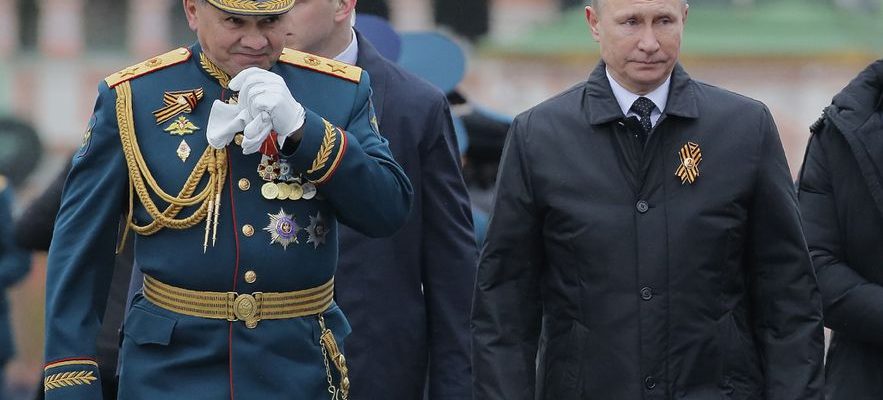In the heart of the Kremlin, Place des Cathédrales, Vladimir Putin gave a speech on June 27 which had not been announced on his agenda, but the images of which were immediately broadcast by the Russian media. “With your brothers in arms, you opposed these unrest, the result of which would inevitably have been chaos,” he told the assembled soldiers, referring to the aborted revolt of the Wagner militia. “In fact, you have prevented a civil war”, he continued, praising their “determination” and their “courage”.
In the front row, on the side, a man did not go unnoticed: Sergei Shoigu. With three public appearances in two days, the Minister of Defense, weakened by the failures of the war in Ukraine, was confirmed in his post. On the morning of the 26th, images had already shown him inspecting a command post in the occupied zone. Later, in civilian clothes, he took part in a security meeting in a Kremlin room where, in front of the cameras, various senior officials were “thanked for the work accomplished during these few days” by Vladimir Putin.
“All this has validation value, Choïgou will stay in place, he remains untouchable,” said Mathieu Boulègue, associate researcher at Chatham House. Between him and Wagner’s boss, Evgueni Prigojine, at the origin of the mutiny that led to a coup on Rostov and a cavalcade towards Moscow, the Russian president has chosen a pure faithful, at the head of the Ministry of Defense in 2012.
The leader of the mercenaries, who has carved out a certain popularity thanks to his interventions on social networks, nevertheless criticizes him violently. For months he has accused him and Chief of Staff Valery Gerasimov of “constantly trying to steal [le mérite] of victory to Wagner”, for the conquest of cities like Soledar and Bakhmout, in the Donbass. He also accuses them of being responsible for the death of “tens of thousands of Russians”, castigating their incompetence and calling for their dismissal.
Vladimir Putin and Russian Defense Minister Sergei Shoigu after a military parade to commemorate the victory over Nazi Germany on May 9, 2017
© / afp.com/Yuri KOCHETKOV
These attacks had not improved the minister’s image among the military. “Shoigu and Gerasimov are almost universally hated in the army”, recalls in a tweet Michael Kofman, director of Russian studies at the Center for Naval Analysis, an American think tank. Some images have also suggested that he was less in court, as when, on June 12, the Russian president turned his back on him, on the occasion of a medal ceremony in a military hospital and that he looked uncomfortable.
“Unconditional Loyalty”
Why, then, maintain it? “Because he is unconditionally loyal and ‘does the job well’ that Putin expects him, according to an operation reminiscent of the mafia, explains Mathieu Boulègue. He is an exemplary executor, in a key position, but whose the most important decisions are informal: like the Russian president, in a way, he has fifteen telephones in front of him and spends his time solving problems. And when it comes to a major subject, he calls Putin .” Like the integration of Wagner into the army, a decision publicly supported by Putin since the events of June 26.
How are they related? Shoigu, in government since 1994 and the Yeltsin era, is the only senior Russian official with whom the master of the Kremlin has publicly appeared on vacation, always in manly poses. We were able to see the two men, shirtless, on a barge, fishing, in the summer of 2017, in the Siberian region of origin of the minister, Tuva, near the Mongolian border. Or at the end of winter 2021, all smiles, accomplices, on these same lands.
The day after the agreement seeing the installation of Prigojine in Belarus, various Russian-speaking Telegram channels speculated about Shoigu’s imminent dismissal. A name came back to replace him, before the Minister of Defense saw his position strengthened: that of ex-General Alexeï Dioumine. The current governor Tula – a region south of Moscow, not to be confused with Tuva – has served in Russian military intelligence, the GRU, as well as in the protection of the president.
Conversely, General Guerassimov, absent from all media in recent days, could he be sacked? “The Kremlin can try to assuage contempt for the leadership of the Ministry of Defense by reducing [son] role in operations in Ukraine, although it is very likely that he will retain him, at least nominally, in the position of general commander of the theater [ukrainiens] and his long-term role as chief of staff,” says the American analysis center Institute for the Study of War.
